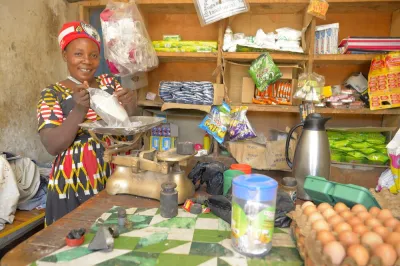FinDev Guide to Women’s Financial Inclusion and Economic Empowerment

In honor of International Women’s Day this year, we asked our friends at FinEquity, the women's financial inclusion community of practice convened by CGAP, to recommend a list of key resources from the past year on women’s financial inclusion and economic empowerment. This guide shares their 13 publication picks, as well as selected blog posts on gender from the FinDev Gateway Blog.
The COVID-19 pandemic was of course a big topic and we have several publications and posts in this guide which discuss its impact on women and how best to support their economic recovery, with a focus on cash transfers. Digital finance and fintech continue to be a trend as the sector undergoes digital transformation, and we are also seeing publications highlighting the importance of understanding gendered social norms and gathering sex-disaggregated data. For more resources on women’s financial inclusion, visit FinEquity.
A Policy Framework for Women-Led MSME Access to Finance
This framework provides guidance to regulators and policymakers in developing policies and regulation to advance access to finance for women-led micro, small and medium enterprises (MSMEs).
Gender Data in Financial Inclusion
Collecting financial inclusion gender data is essential for uncovering who is excluded, which financial products are used and by whom, how women’s financial needs differ from men’s and why products need to be accordingly adapted. This brief highlights how sex-disaggregated data can support women’s financial inclusion, looking at use cases in policy and regulation, program and product design, monitoring and evaluation.
What Works To Enhance Women’s Agency: Cross-cutting Lessons From Experimental and Quasi-experimental Studies
How does access to financial services and other interventions impact women’s agency? This paper analyzes the evidence from 160 randomized controlled trials and quasi-experiments in low- and middle-income countries to summarize what we know about supporting women’s agency along with what needs additional research
Gendered Social Norms in Financial Inclusion
This diagnostic aims to identify social norms that affect how women access, use, and benefit from financial services. By identifying actionable insights, practitioners can design interventions that target the root causes of consumer behaviors that limit the potential benefits of financial inclusion interventions for women.
COVID-19 Response
Supporting Women Throughout the COVID-19 Emergency Response and Economic Recovery
This brief from the World Bank’s Gender Innovation Lab highlights evidence on mechanisms that can help protect the lives and livelihoods of women and girls in Sub-Saharan Africa in the context of the COVID-19 pandemic and translates them into emergency response recommendations.
Digital Cash Transfers in the Time of Covid 19
This brief advises governments on how to digitize cash transfers in ways that proactively empower women and support their inclusion. It outlines why women are at heightened risk of exclusion during the rapid scaling and digitization of cash transfers, and offers concrete policy design options to mitigate exclusion risks and maximize impact.
COVID-19 and the Insurance Industry: Why a Gender-Sensitive Response Matters
How can insurance companies support female employees, customers and agents during the pandemic? This guidance note highlights best practices and explains how women can contribute to the success of the insurance industry and how insurers can better engage with them during the crisis.
Delivering on the Potential of G2P
Through a mixed-methods analysis of a nearly 2,000-person survey and robust qualitative research, this research examines what influences beneficiaries’ use of accounts in Indonesia’s largest conditional cash transfer, Program Keluarga Harapan (PKH). It also provides recommendations for government-to-person (G2P) programs to ensure women can make informed decisions about the use of accounts.
Digital Finance and Fintech
Algorithmic Bias, Financial Inclusion, and Gender
Algorithm-enabled credit decisions have the potential to create a level playing field for female customers worldwide—but only if we find and mitigate biases emerging through technology inputs and processes. This report is part thought experiment and part primer, exploring the promises and pitfalls of using digital tools to open up new credit to women individuals and entrepreneurs. It explores two key questions: (1) Where does gender-based bias originate? (2) How do we mitigate such biases in the emerging digital credit space?
The Case for a Gender-Intelligent Approach: An Opportunity for Inclusive Fintechs
This brief examines design principles employed by two fintechs working in Sub-Saharan Africa, showing the potential of gender-aware design, and how to design for specific needs and constraints of women, while accounting for the norms that define their lives.
Advancing Women’s Digital Financial Inclusion
This report highlights 10 policy options to address the three main categories of barriers to accessing financial services for women and girls – lack of access to the basic requirements for financial inclusion, limited digital financial infrastructure and unequal laws and regulations.
Digital Subwallets and Household Dialogues
This report shares the results of a randomized controlled trial conducted in rural Uganda from 2017 to 2019 to test the effectiveness of two interventions intended to help poor rural women with male partners maintain control over their own money and achieve a more equal role in household financial decision-making. The innovations tested were: (1) a mobile banking service with digital subwallet folders labelled for women and (2) the same service coupled with a course of seven household counselling sessions.
How Fintechs Can Profit From the Multi-Trillion-Dollar Female Economy
A survey of 168 fintechs and 30 investors provides insights about how fintechs have been approaching and serving the women’s market, iIlluminating gaps in gender disaggregated data, business case and use case development.

Top Five Digital Financial Service Features That Impact Women’s Access and Use
Research in Kenya and Côte d’Ivoire provides guidance for DFS providers and regulators on how to help ensure that digital tools make women more - not less - financially included.

Freedom on Wheels – A Ride to Economic Empowerment
How motorcycle loans could help women banking agents in India bring financial inclusion to remote and vulnerable populations.

Will the Pandemic Exacerbate or Mitigate the Digital Gender Gap?
COVID-19’s disproportionate impact on women must be urgently addressed through the provision of digital financial literacy and access.

Financial Inclusion Is Going Digital. Can Women Follow?
While digital finance has gained market share for years, it is possible no single catalyst has been a greater accelerator than COVID-19. Are women participating in these digital solutions?

Empowerment Begins With Identity
Opening a bank account in many countries is a cumbersome process requiring official documents that women often don't have. Digital ID systems can make this process more accessible and help enable women’s financial inclusion.


